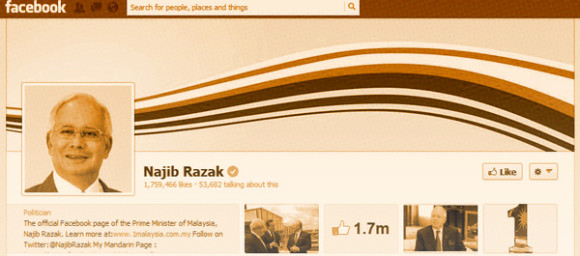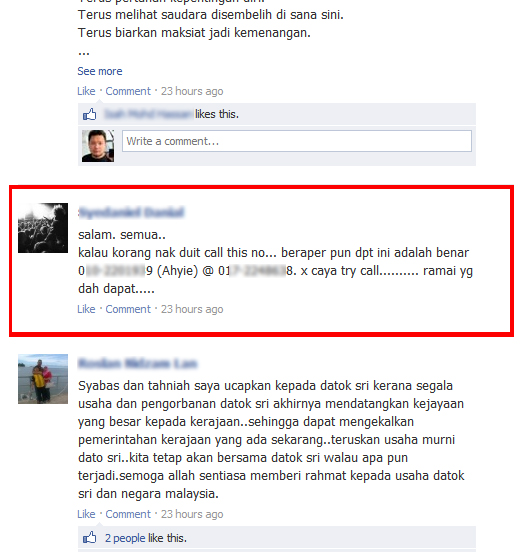
THE 13th general election since independence was branded by many, including Prime Minister Datuk Seri Najib Razak, as a “social media election”. From reading the traditional media, our prime minister appears to have impressive social media credentials. The Star hailed him with the headlines “Najib is tops with 419000 Twitter followers” and “Najib in world Top 10 of ‘Twiplomacy”; while the New Straits Times declared “Najib is world’s 11th most popular political figure, first in Malaysia on social media”.
In his effort to be Malaysia’s most digitally connected politician, the prime minister can be found on Facebook, Twitter, Youtube and Instagram, in addition to blogging at www.1malaysia.com.my. He has also appeared on Google Hangout.
Going by the statistics, Najib appears to be hugely popular on social media, with over 1.7 million Facebook “Likes” and over 1.6 million Twitter followers. However, do these statistics co-relate with the actual popularity or likeability of the prime minister? What is the true story behind these figures?
Understanding “Likes”
The problem with social media metrics such as the number of “Likes”, fans, tweets and retweets is that they are quantitative. They are, in other words, simply numbers that do not always tell the complete story.
The Facebook “Like” provides a good illustration of this. In most instances, to post on someone’s Facebook page, you have to “Like” their page first. This means that to praise or complain about a business or a service, and to engage with a public figure — whether positively or negatively — you ironically have to “Like” them first, regardless of whether you actually do!
Accordingly, the number of “Likes” on a page may not actually reflect a genuine like as we understand it. A percentage of those “Likes” may simply be individuals liking the page in order to post negative comments. Some may also reflect individuals who have liked the page to keep track of official statements.
A cursory glance at some of the comments posted on Najib’s Facebook page indicates there are negative comments interspersed among the positive and adoring ones. It also appears the page is not immune to spam, as the screenshot below indicates:

As emerging technologies author Torie Bosch puts it: “On Facebook, ‘Like’ doesn’t mean like anymore. At its lightweight heart, pushing the button really says ‘I hear you’, ‘Uh-huh’, ‘I acknowledge this’, or ‘Yup.’ It says: ‘I read this and thought about it for a second’.”
So the prime minister’s 1.7 million “Likes” don’t necessarily reflect actual liking.
Baking up social credentials
And then, there are the fakes. Fake “Likes” or fake fans come from dummy accounts created to pump up a Facebook profile, or, in some instances, to win a Facebook-driven competition. Creating a dummy account is easy — simply create a new email account on any free provider and create a Facebook profile tagged to that email account. In Malaysia, there are even companies that specialise in what is termed “social media traffic reselling” — effectively, the selling of “Likes” and Facebook fans.
Fake fans and “Likes” are such a serious problem for Facebook that the company embarked on a major purge in 2012 to rid the site of fake accounts and fake “Likes”. Facebook explained the move in a blog post: “A ‘Like’ that doesn’t come from someone truly interested in connecting with a page benefits no one. Real identity, for both users and brands on Facebook, is important to not only Facebook’s mission of helping the world share, but also the need for people and customers to authentically connect to the Pages they care about.”

It is difficult to know the extent to which a page is populated by fake “Likes” and fans. However, one good way to gauge what is going on is to examine two key metrics — the number of “Likes” vs the number of “People Talking About This”.
The “People Talking About This” metric is derived from a variety of interactive activities such as sharing, posting, commenting and answering questions. It provides a clue as to the level of engagement that is going on between a page and the people “Liking” it. Facebook explains that by examining the number of people “talking” about a page, people can get a good sense of whether the page is active and engaging. If a page has a high number of fake fans or fake “Likes”, there will be a low degree of activity or engagement.
Thus, instead of merely taking into account Najib’s 1.7 million Facebook “likes”, we should perhaps pay more attention to the fact that only 58,003 people, or 3.4% of his total “Likes”, are talking about him.
As it is, the authenticity of the prime minister’s Twitter popularity is already in question. Tools provided by social media analytics companies Socialbakers and the Fake Followers Check website suggest that 51% of Najib’s Twitter followers are fake and 21% are inactive users. This indicates that only 28% of Najib’s Twitter followers are genuine. Both Socialbakers and Fake Followers analytics have a margin of error of 10% to 15%.
Savvy vs integrity
For all the hype over Najib’s social media savvy, a closer examination of the statistics reveals that there is a lot more to online engagement than mere numbers. Numbers don’t always reflect popularity. And just because a politician is constantly online, or at least appears to be, doesn’t meant that he or she is genuinely listening and engaging with the people.
The possible use of paid or bought fans and “Likes” also reflects poorly on a politician’s integrity, or, at the very least, the integrity of the people he or she employs to manage their online persona. It is also perhaps a reflection on the current administration, which appears, at times, more intent on managing perception than actually tackling the issues at hand. ![]()
Bernice Low writes on technology issues for CNET Asia. When not digitally skewering someone in her blog, she’s busy dreaming up of Hollywood blockbuster movies in her other life as a screenwriter.


ellese says
Sometimes people write rubbish. So what? A like for Najib is also similar to the like for Anwar, LGE or for that matter a like for every other person. A person who likes me need not necessary be a fan of me for life. You don’t need a write up like this to explain simple common sense. What’s so exceptional with Najib’s likes that’s so different from those likes of Anwar, DAP, 1 million Chinese Don’t Want MCA to Represent Them, etc etc ?
lkl says
Do these other pages that you mention get the same phenomenal amount of likes like Najib does? Najib is within ‘World Top Ten’, for god’s sake.
Oh, he is exceptional, he is ‘popular'(even though he is only the minority PM).
BenG says
“What’s so exceptional with Najib’s likes that’s so different from those likes of Anwar, DAP, 1 million Chinese Don’t Want MCA to Represent Them, etc etc?”
The stupid fact that people and papers brag about it maybe? I don’t see anyone bragging that DAP has xxx likes for example, or 1 million Chinese Don’t Want MCA to Represent Them has yyy fans.
amin says
I actually second this article without even finishing it.
It is basically the same way how Facebook-driven entrepreneurs work, they’ve got like tonnes of likes after posting each advertisement (which I prefer to call spam, since from time to time I just mark them as spam, and to some extent, just un-friend them).
Jo says
Re: Understanding “Likes”.
This point is rather moot as it appears that the PM’s Facebook page does not require a person to “like” it before viewing or posting comments. Took me all of five seconds to research. Therefore it is safe to assume that those “likes” were given genuinely. Of course, the possibility that the “likes” were bought is there but at this point that is purely speculative and would be difficult (and tedious) to prove.
The low percentage of people talking about him (3.4%) versus number of likes is no longer a valid metric since practically anybody can comment on the page. However even if this metric and the article’s situation were valid, this would suggest that the likes are genuine because if more of those likes were from people who wanted to post negative comments, the percentage would have been higher.
Good article on the mechanics of social media though.
NB: I’m no fan of the man. I just want to see more honesty and accuracy from the media, especially a site like The Nut Graph.